#vampire analysis
Explore tagged Tumblr posts
Text
Vampire Knight Analysis: Classism
Long Post !

10,000 years ago, climate change caused the apocalypse. Because of lack of food and resources, vampires are at the top of the food chain, preying on humans. Kaname is a pureblood and the progenitor, we first see him as the Lord of a village, in which he gives the villagers his blood to sustain them and keep them healthy, but in secret he takes their blood to sustain himself. Eventually, he run-out the village when they suspect he is a vampire.
He is in a position of power over his people and while it is framed as benevolent that he is healing them and helping them live, he is also stealing from them in secret. I think it is a fair comparison to equate this to money or goods. Serfs work the land for their lord and in return he offers them protection. While the lord may be a good one, he is still partaking in a power structure that ultimately benefits him. A lord still takes their livelihood as payment and in the way of secrets, may be oppressing them in ways they are not aware of, taking things they did not agree to give away.
Kaname along with The Hooded Woman observe how their kind, pureblood vampires, have taken to turning many humans into vampires. But the hooded woman says this is not for equality, the purebloods are turning humans to make slaves of them. So purebloods are explicitly abusing the power structure as the upper class and abusing the lower class (humans) turning them into slaves (Level D).
As the story continues The Hooded Woman and Kaname oppose the purebloods, rebel against them, and also search for a cure to vampirism. They recognize that the system that they are both a part of, needs to be dismantled.
Through their research, Kaname becomes disheartened but wishes to make the necessary sacrifice to liberate humans from vampire tyranny. The Hooded Woman however is the one who has been working with a group of humans, having them ingest her blood to gain her power. In doing this she creates Hunters. Hunters who are human yet possess the strength of vampires given to them by a pureblood. She then casts her heart into a fire that will produce the Parent Metal which they can then make weapons to defend themselves against the vampires.
Which I find to be such an interesting dynamic as we can view this as a royal who despises the royal class, donating all of her funds to lower class people for a rebellion. The upper class woman willingly sacrificed herself “Viva La Revolution!” style for the lower class. However for me, this feels a little weird subtextually. The Hunters having their genetics changed by her pureblood makes them have similarities to vampires, like Kaien living an unusually long life, or the Hunter Twins curse. I will return to this thought later.
Kaname fights the revolution with Artemis for a period of time, but eventually loses hope that vampires will ever be stopped or cured. He abandons the cause, abandons the humans, abandons the Level D/E vampires to their doom.
Let’s now focus on the time period that Vampire Knight takes place:
In VK we now have a very literal class system of vampires as illustrated by the pyramid in the manga:

Level A: pure bloods that are the reigning class (born vampires, beautiful, precious, powerful, manipulative)
Level B: the noble/aristocrat class (not as powerful as purebloods but still beautiful and have specialized powers)
Level C: common vampires (that we see very little of … I can’t think of a single named character that is one)
Level D: vampires that used to be human (can only be turned by the pure bloods, seen as lesser and generally not accepted as part of vampire society)
Level E: vampires that used to be human who have lost their humanity and sanity (ugly, bestial, outcast, thought of as murderers, violent, often dressed like they are poverty level).
And finally humans (viewed as a food source, but strangely are treated socially above Level D and Level E vampires, almost a Level C/F combo???).
Let’s break down this pyramid:
Purebloods are reflective of royalty. At one point Kaname was formally titled The Vampire King, and even though they are not per se a legally recognized monarchy, the role of the Kuran family is the same. They are a hierarchy based on ancestry and bloodlines exactly like a monarchy. “Pureblood” is very obviously a classist ideal. Blood unmixed, blood not dirtied by “lower classes” or also in this case, human blood. Royals were thought to have “blue blood”; that they were called by divine right as sovereign, and that they were special and above everyone else. It is very much the reason why incest in royal families was practiced to “keep the bloodline pure”.

Incest is a reoccurring theme in Vampire Knight that is controversial and something I have always been confused by and wildly uncomfortable with. We have themes of incest with Kaname and Yuuki, Haruka and Juri, as well as Rido, and later with Ai and Ren.
Incest between Rido and Juri is framed as assault and not right, but the incest between Juri and Haruka is framed as loving and pure. When Yuuki finds out Kaname is her brother she remarks that it’s strange that she was in love with her brother this whole time, to which Kaname says: ‘Vampires are just beasts in human form. We are already betrothed. Our parents before us were siblings.’ He justifies the incest as bestial and a system that she was born into as a pureblood. (Which is an interesting contradiction as animals do not often practice incest as it is not good for genetic diversity. However, selective breeding can be something that humans force animals to do which does have parallels with royalty practicing incest. There is a different theme in VK that is “Humanity VS Beasts (in human form)“ that I will hopefully write about separately but right now we are going to focus on Classism)
I think having this correlation between royalty and incest makes the presence of it in this particular series make more sense and as a part of the horror genre (and generally) incest is supposed to be uncomfortable and grotesque. Vampires often manifest our social anxieties with class and sexuality.
I also want to touch on the term “pureblood” and how it is a clear link to eugenics.
Japanese vampires have distinct differences in interpretations from western vampires, there is a wonderful video about Vampire Hunter D that explored some of those differences (UNFORTUNATELY, It was by @thegamingmuse on YouTube and IT HAS BEEN TAKEN DOWN but have this one ‘History of Vampires in Japan’ instead). Like how Japan’s view of classism is very affected by the country’s long history with feudalism and subsequently their past with fascism. I want to stress that these may not have been the author’s clear intentions but rather things that affected her writing subconsciously.
Eugenics began to gain popularity in Japan around the 1880s when scientists introduced a theory that through selective breeding they could make the people of Japan (the Yamato race) stronger and smarter to dominate over other cultures including the west. They valued “junketsu”--pureblood and looked down on “konketsu”-- mixed blood. Social Darwinism, forcible sterilizations and abortions began occurring more and more in the early 19th century and specifically in the 1930s at the height of imperialism. They deemed certain traits to be undesirable such as disability, genetic disease, criminal inclinations, and even race (look up the indigenous people of Japan like the Ainu), etc. Ableism and xenophobia are still very much ingrained in Japan’s culture today because of this.
It is hard to talk about purebloods and not talk about Level E’s at the same time. Only Purebloods have the power to turn humans into vampires so they are therefore responsible for all Level D and Level E vampires that come into existence.
Level D vampires in Vampire Knight are treated with disdain, they are usually servants or scandalous lovers to their higher class pureblood masters. As we see with Shizuka, she took a human lover that ended up being a target because society did not approve of her relationship to him. As well as Shizuka’s master bond over Zero. He physically has to fight to harm her because the power of the bond, Master vs Servant, Creator vs Creation, is so strong. They are meant to be slaves with no will of their own.

Vampires that used to be human need the blood of a pureblood to remain stable and sane and when that blood isn’t given they lose their humanity. They roam the streets with insatiable thirst, killing to barely survive a cursed life. Food that did not die, only to be used and discarded. Level E vampires are those that are discarded, plaguing the humans with violence and fear.
So purebloods, like royalty, are framed as desirable, beautiful, fashionable, the peak of society versus Level E’s that are portrayed as starving, ugly, bestial vermin that need to be slayed. They both prey on humans but one is deemed more villainous because of their lowly state. The Level E’s are the lower class created by the upper class. The upper class took their resources and left them in the streets to die. They are othered and thought of as a plague to both human and vampire society. Does that remind you of the eugenics that I was just talking about?
The Level E’s are also portrayed as mentally unstable, mirroring Japanese disdain for mental illness. Hikikomori is a phenomenon in Japan of severe social withdrawal. One of the reasons this could be happening is because it is not socially acceptable to have a disability, visible or not. It is more acceptable to remain inside your home. Much like ‘The Ugly Laws’ in the United States: “These laws targeted poor people and disabled people. For instance, in San Francisco a law of 1867 deemed it illegal for "any person, who is diseased, maimed, mutilated or deformed in any way, so as to be an unsightly or disgusting object, to expose himself or herself to public view.”
I’ve always thought it was interesting and really sad that in VK they search for a cure for vampirism, but they never specifically say that it’s to help Level E’s restore their humanity or their sanity. It’s almost as if the cure is more geared toward curing purebloods and the acceptable parts of vampire society. But that view was most certainly influenced by a group.

Aristocrats are exactly like they sound, they are privileged in high society. In VK they hold a lot of power though they are not as powerful as the Purebloods they are subservient to. Still they pull the strings and abuse their station. In many ways they control what is socially acceptable and what is not. Vampiric Aristocrats are as their nature is, greedy and hungry for blood. Pureblood is coveted by them and held as a rare and precious commodity. They are the ones encouraging incest to keep their blood stores full. In Shizuka’s case it was her family and the aristocrats that kept her caged after deeming she was unstable (there’s that disdain for mental illness and disability again, even though inbreeding can cause such things even in royalty) The Aristocracy is also responsible for supplying humans for Purebloods to feed on, such is the case with Kaname meeting Seiren.
The Aristocracy benefits most from how society has been set up, even with their dealings with humans. The secret of vampire society is best kept, and that is why they sneer at vampire/human coexistence. Humans are just food and tools. Like the Hunter Society.
The Hunter Society as it is in VK’s time is corrupt, we find out the President has been in league with the leader of the Aristocracy, Ichio. In exchange for protection they get pure blood for their drinking pleasure. Though it is not explicitly said, the Hunter Society is basically an extermination system for the victims of purebloods. Hunters only kill targets on the list curated by the corrupt President who with their ties to the Aristocracy would know what humans were turned into Level Ds and Es. The real world equivalent for hunters is the police. The police are funded by the government, are easily corrupted, and often unfairly discriminate against the lower class, arresting them for stealing food when the upper class hoards it all to themselves.
So like I said before we have this really interesting view of the Hunters as being like vampires: being a part of the leech, upper class, and feeding into a system of oppression.
~~~~~~~~~~~~~~~~~~~~~~~~~~~~~~~~~~~~~~~~~~~~~~~~~~~~~~~~~~~~~
I might do more parts to this as a series, such as analyzing the class system and how it pertains to certain characters, but those were all the thoughts that have been bouncing around in my head for the last two months. Let me know what ya'll think or feel free to request a take!
#vk#i'm anime trash#vampire knight#vampire knight analysis#vampire analysis#zero kiryu#yuuki cross#kaname kuran#pureblood#pureblood vampire
33 notes
·
View notes
Text
Vampires are human and that's what's terrifying about them. The whole rhetoric that vampires loose their human soul upon their transformation is just a good reason to kill them. And it also does make them seem like absolute monsters, untrustworthy liars, beasts. It offers solace to separate humans from monsters with such an obvious and clear line. But vampires are human in the exact way a human is human. What makes them monsters is that they have no limits and no repercussions for their actions. They're immortal, strong humans that can do as they please without being punished. That's why they're monsters. It's not because they're not human anymore. It's because they're as much human as one can be. They're humans with no limits.
178 notes
·
View notes
Text
youtube
with all of the news of season 2 coming out, i wanted to share my video that i made on season 1 of interview with a vampire.
#Youtube#louis lestat#are louis and lestat lovers#louis and lestat kiss#louis and lestat#louis and lestat 2023#lestat and louis#prince lestat and the realms of atlantis#maven of the eventide#lestat#vampires#interview with a vampire 2022 lestat and claudia#movie analysis#louis & lestat#vampire analysis#the vampire lestat#the vampire diaries elena and damon#maven of the eventide anne rice#literature analysis#lestat de lioncourt#style analysis#analysis
12 notes
·
View notes
Text
Nosferatu (2024) and the Revenge of Lucy Westenra | A writing experiment
I. How We Keep Getting Dracula Wrong Let’s start with this: Dracula is not a love story. Not in Bram Stoker’s novel. Not in its core themes. Not in the reality of what Dracula does to his victims. And yet, time and time again, adaptations have tried to make it one. They have taken a story about predation and turned it into a story about longing. Coppola’s Bram Stoker’s Dracula gave us the…
3 notes
·
View notes
Text
I'm writing (more like stuck forever in editing) a book right now called "Purely Symbiotic" about a human protagonist taking a homeless vampire who was kicked out of his home (this book is hella queer) and offering blood to him in exchange for his companionship. There are no werewolves (sorry!), and while there are aristocratic vampires (not all of them, but some), vampires in general are very much framed by the end as people who also need to eat.
Consider a vampire's reliance on blood as a metaphor for living paycheck-to-paycheck and depending on the kindness of others to get by, and the desparation that can make one slip into taking.
and
[Vampires] are people who need to eat to stay alive too, and it doesn't hurt anyone if it's done right, but it's still heavily stigmatized anyway.
I love these quotes because yes! You all get me! It's all about community. Humans need food, protection, and community. Vampires need food, protection, and community. They need these things because at the end of the day, they are all people.
Not to gush about my book, but it is revealed at some point that the creation of vampires may not be because of anything necessarily evil or to "steal blood" from others or to gain power/control, but as a means to create closer bonds in community through blood sharing. Like how it was said before
It's only a problem if you're portraying the vampires as leeches in the first place.
The MC is basically BEGGING the vampire to take their blood even though he doesn't want to, not because he doesn't want blood from them but because of that stigma that vampires steal. That's why the mc sets up this deal (literally why the story has 'symbiotic' in the title and why it describes their dynamic well). There is something so viscerally uniting and communal and dare I say queer about supporting and helping someone by giving a literal part of your body to them, and for them to return that in your bond. The fact the vampire is a canonically queer man kicked out of his home, literally crashing on someone's couch in an emergency because he has nowhere to go, no prospects, literally can't get a job to support himself, IDK that support between queer people when those in power refuse to give that just makes me *vibrates into another dimension*. I want to see more healthy human/vampire dynamics!!!
I literally can't put into words how everyone in this chain GETS me right now. I can't even put it into words. It's all so intersectional. Poverty, community, queerness, you can dive so deep into this.
Also thanks for the book rec @excessive-vampires. I need more gay vampires in my life.
I want to see a work of fiction that reverses the "vampires are snobby upper class, werewolves are brutish lower class" stereotypes
#vampires#vampire story#vampire analysis#writing#writblr#purely symbiotic#book recommendations#queer analysis#poverty analysis#media analysis#media literacy#intersectionality#community#queer community#writing community#oh yeah can't forget#werewolves
81K notes
·
View notes
Text
Can we talk about how in the show Lestat and Armand are framed as narrative foils. Armand and Lestat who are both so aggressively theater kids, but Lestat who acts, who draws in the attention and holds it, and Armand who directs, who shapes and manipulates the narrative. Armand and Lestat's obsession with Louis and his love and frustration with his melancholy over Lestat and Claudia respectively. Who both felt second in his heart. Who fear loneliness above all else. Lestat taking what he wants to excess - no impulse control, and Armand letting things happen to him and trying to manipulate situations to get what he wants but never taking it. Armand, who even in the end, so much more powerful, never physically imposes himself on Louis. Armand who seeks complete control in subtle insidious ways. Lestat who seeks control in the physical. Armand and Lestat brought into vampire life in horrifying ways tangled up with SA. Armand who still talks about his maker with reverence, Lestat who hates his maker. Armand who pours all of himself into his partner, willing to shape himself into what they desire but ultimately needing control to feel safe. Lestat who pours all of his love into his partner but unwilling to change himself and ultimately cedes control in moments to maintain the relationship. Armand who clings to his breaking apart relationship for 77 YEARs, Lestat who let Louis go. Lestat and Armand who watch Claudia die, but one as a father and one as a murderer. Lestat and Armand so intense in their love but Lestat so painfully external and Armand so painfully internal as characters. Both constantly acting and putting on a face. Lestat as Mozart and Armand as Salieri (in the flashback scene!). Armand who loves routine and structure and repetion, Lestat who craves change and excitement. The calling cards are echos, who learned from who. Armand teaching Lestat the vampire gifts, Lestat teaching Armand a new way to live. on and on....
#I'm tired of ship content#Give me complex narrative foil content!! give me the haunting and doomed by the narrative content! Give me the analysis of the fucking prop#and sets and amazing costume design#there is so much in this show and no one is talking about it!!!#They are so two sides of the same coin coded#autism vs adhd coded#my toxic wives whom i love#lestat de lioncourt#lestat#armand#the vampire armand#amc iwtv#iwtv#armand iwtv
2K notes
·
View notes
Text
Oughh it’s 2:00 AM and I’m having Thoughts and Emotions about Marceline the Vampire Queen. Like— she’s a punk bisexual and cool as heck but she’s also a terribly sad immortal with mom issues and double dad issues BUT BUT ALL of her parental figures gave her unconditional love so strong that it fundamentally saved the human race. Marceline saved the humans who hated her because her demon dad passed on the legacy that helped her grow powerful and her mom sang her lullabies and her adopted father clung to every shred of his breaking mind to protect her childhood. She was so loved! She was so loved! And that love never went away it stayed inside her even when all three of her parents hurt her so badly that the pain stuck for a thousand years. And all of the ways they hurt her were BECAUSE they loved her, so Marceline never learned to differentiate what it meant to love someone and hurt someone. So she hurts the people she wants to protect, she’s rough with the people she wants gentleness from, she abandons the people she wants by her side. And so much of the show is her collapsing and falling apart because she can’t figure out why why her relationships are all so broken. And then little by little she gets closure with each chapter of trauma— with her demon father, with her mother’s memory, with dear Simon— which then allows her to finally be at peace with herself and accept love— pure as it is— and give it back.
#adventure time gets the congrats for writing the saddest characters in the world award#haven’t even delved into my Fern rant cause I implode each time#and Simon Betty! Ow ow ow!#Minerva…#I will never get over how intricate and human and layered and complex AT’s writing is#phenomenal speculative fiction world building and character writing#In a cartoon that set the precedent for stupid fart gags#anyways if you’ve read this far into the tags marceline is my baby girl and she really really needs a hug#marceline the vampire queen#marceline#adventure time#at#adventure time analysis
896 notes
·
View notes
Text

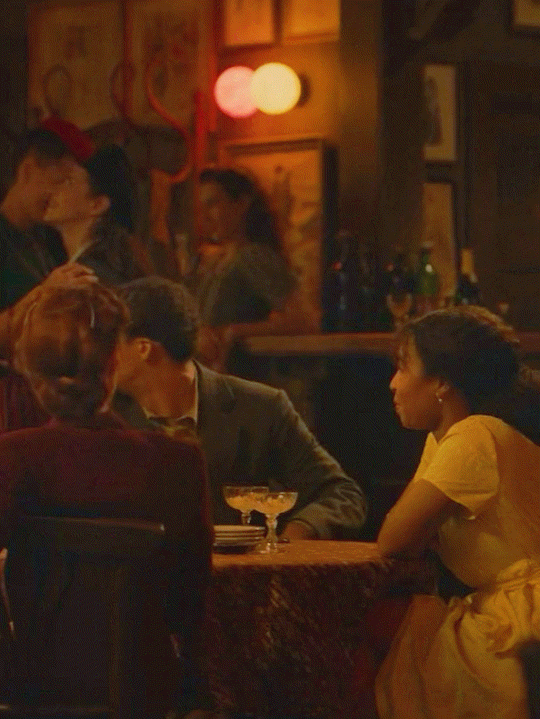
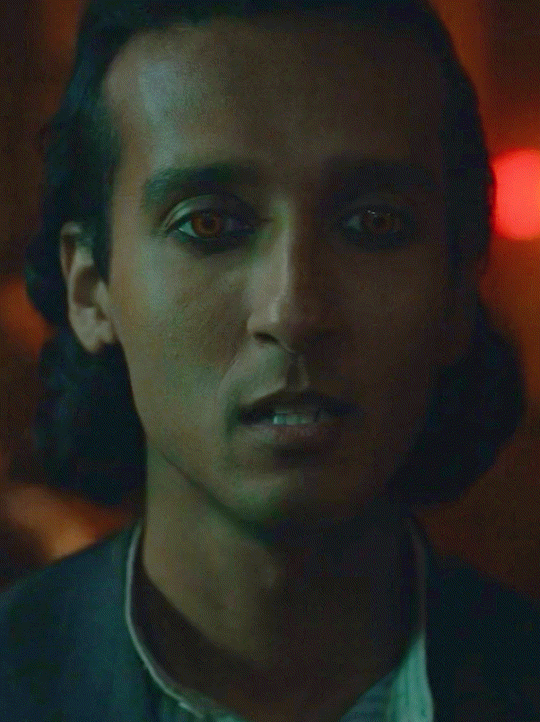
“Armand is very, very skilled at preserving his existence. So that doesn’t mean that he’s always happy…but I think he will do anything to survive…He pretends to give this facade of not being the child, but he is. He is the child.” - Assad Zaman, Mysza Interview
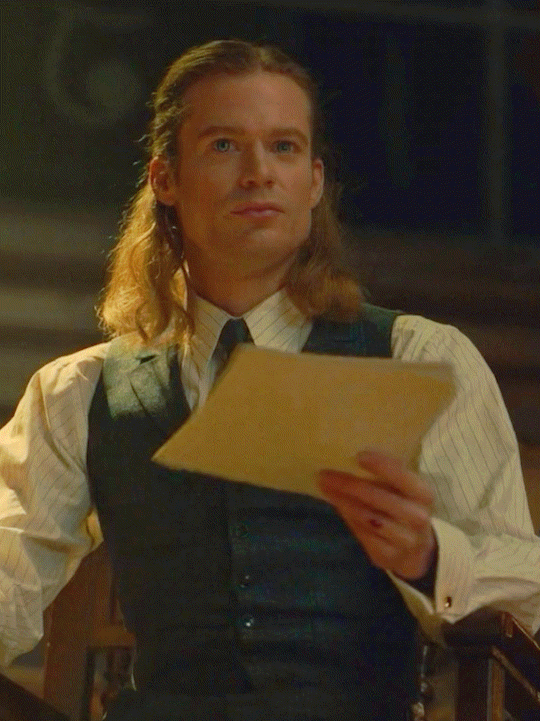
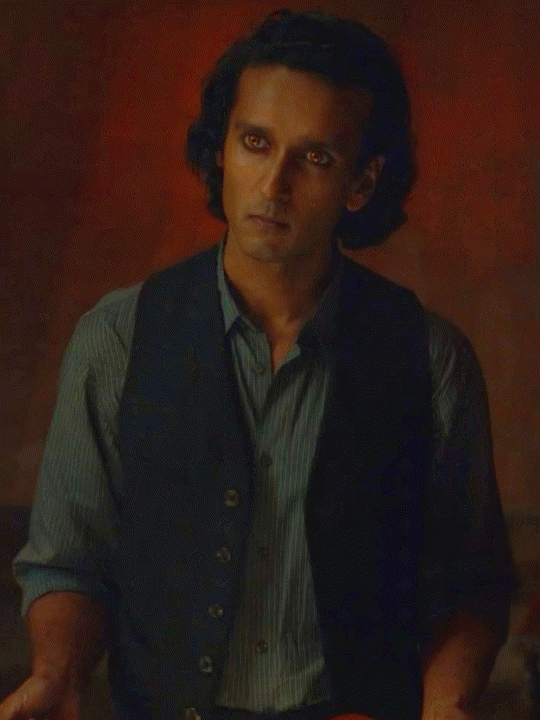
“And I think that’s more powerful than saying one vampires is bad and one vampire is good, or Armand was controlling the whole thing. If Armand is the big arc villain of the show, it takes away the agency. Louis’s gotta have agency. Lestat’s gotta have agency. And Armand. And they’ve gotta have control and be responsible for their own actions.” - Sam Reid, Autumn Brown Interview Outtakes
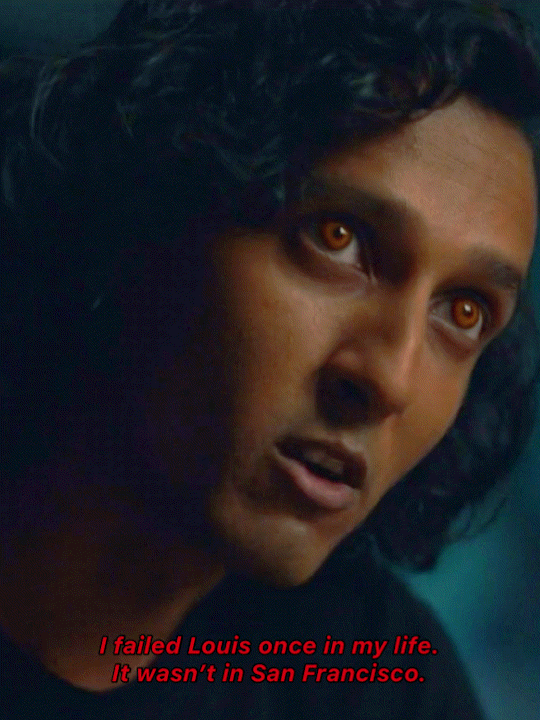
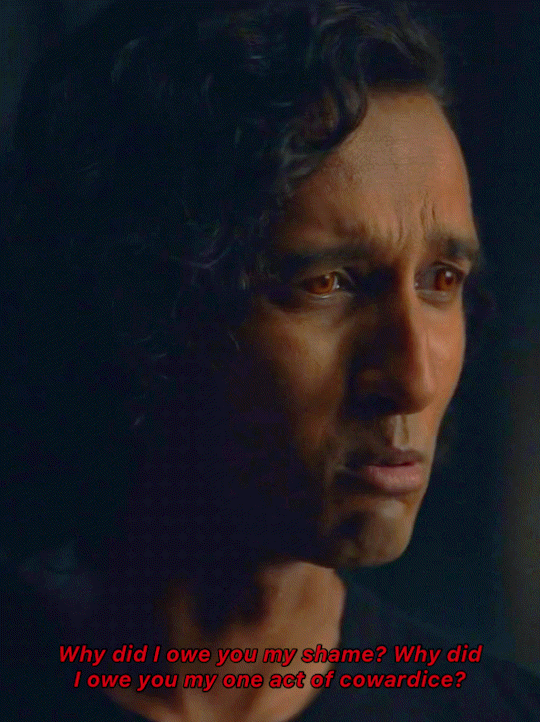
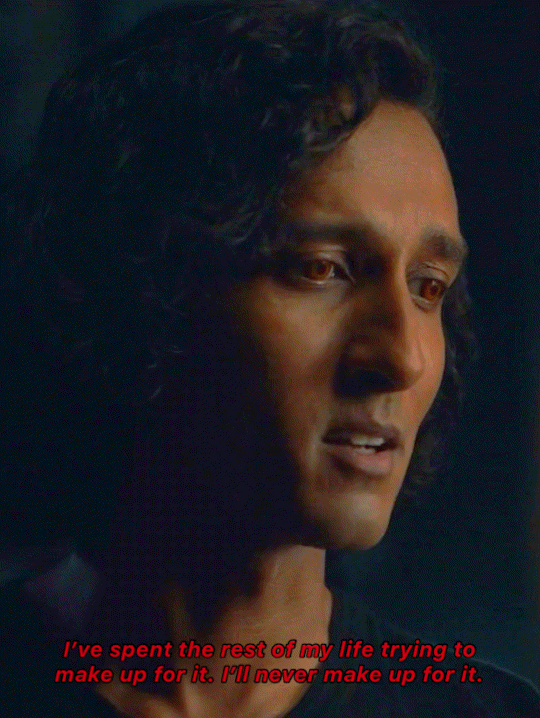
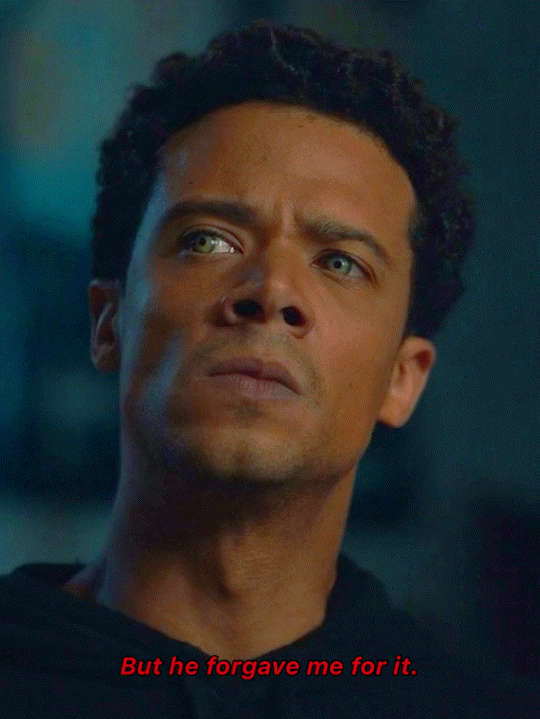
“A number of my writers have a [very rich] point of view about Armand that may not be totally satisfying by the end of this season, but actually allows for so much more stuff to come up after this…Just wait. Everyone will get their turn. You will be able to understand from their point of view why they do what they do. We don’t have a lot of room for mustachey-twirly villains on our show.” - Rolin Jones, Rotten Tomatoes
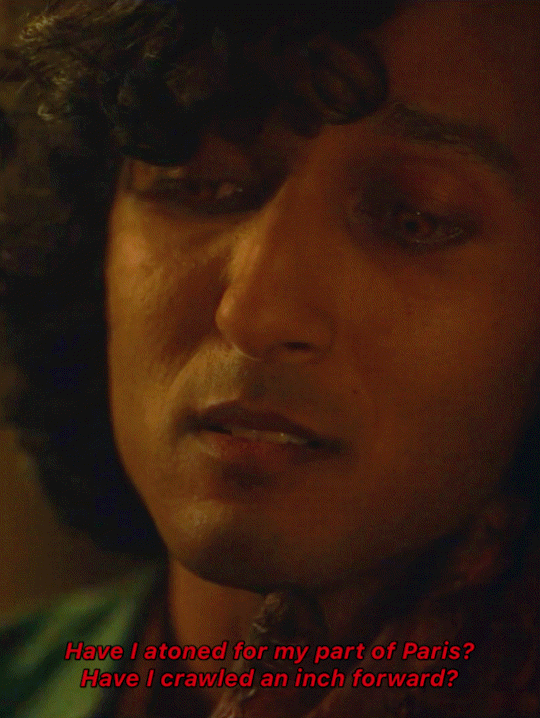
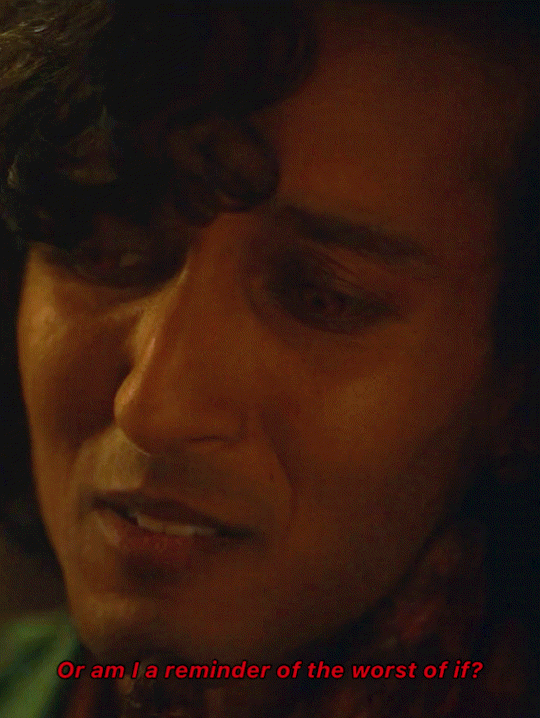
“We landed on the idea that [Armand] had two cowardly moments in his life. And that any lies after that were all to cover up those two, but that there were actually really, really sincere efforts to try and make up for it, to be better than that, and that he had.” - Rolin Jones, The Wrap
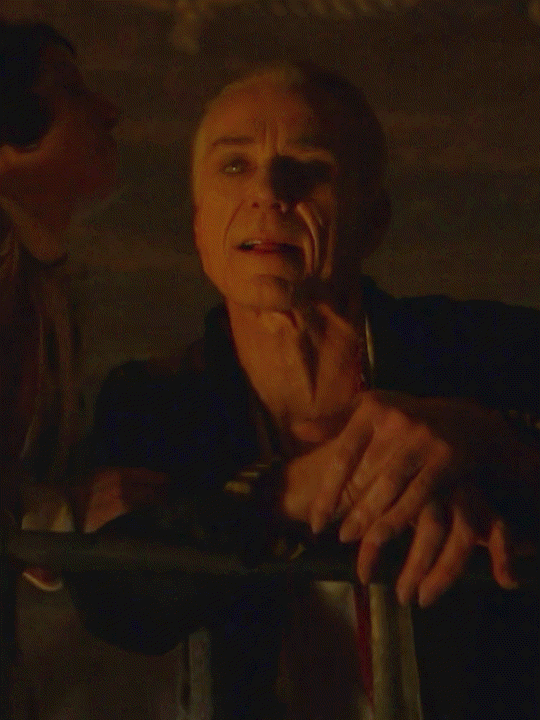
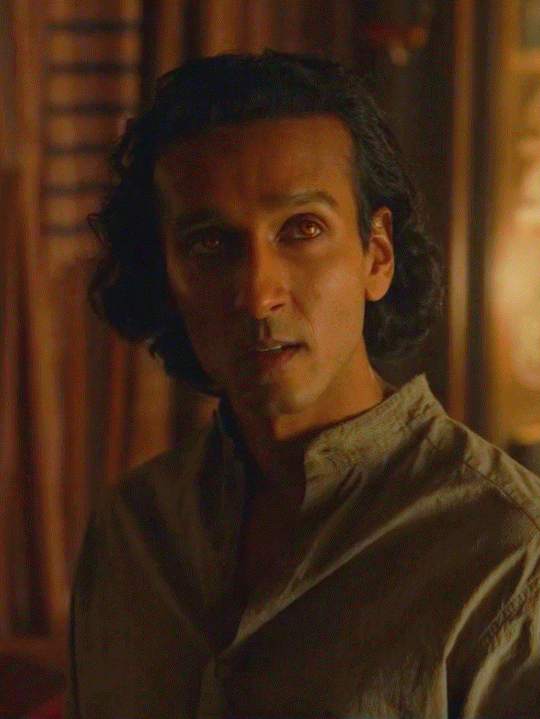
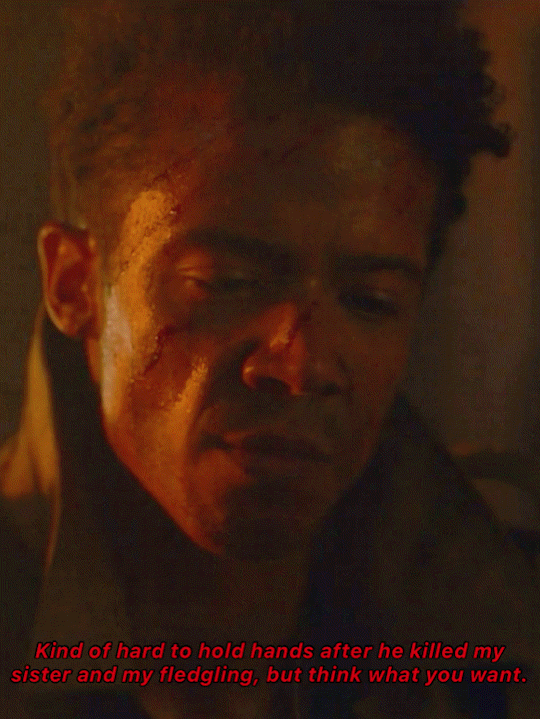
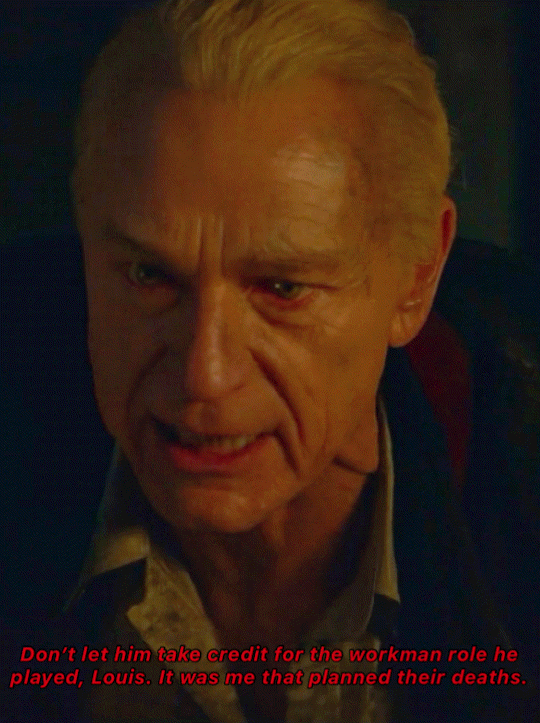
“He directed it, but it wasn’t his choice to do it. The fucking nugget of complexity is that he’s not a mustache-twirling evil guy all along. He has just thrown himself, well, been thrown into a situation and has done despicable things to survive, granted despicable things and a despicable lie to hold for so many years.” Assad Zaman, TV Insider
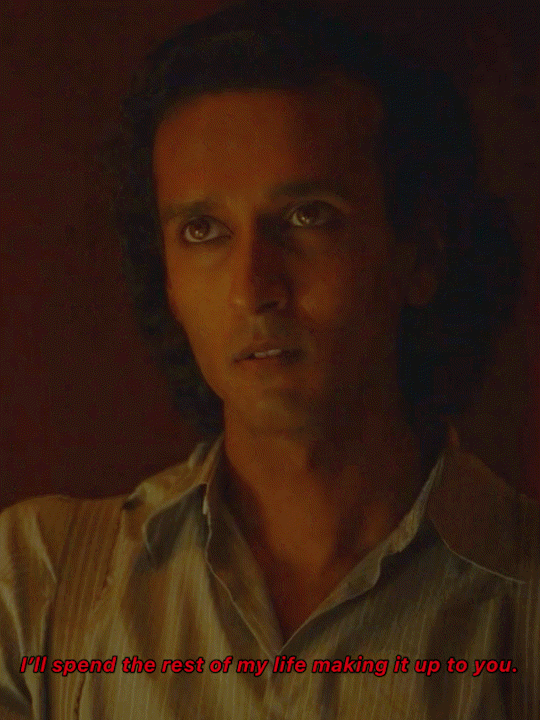
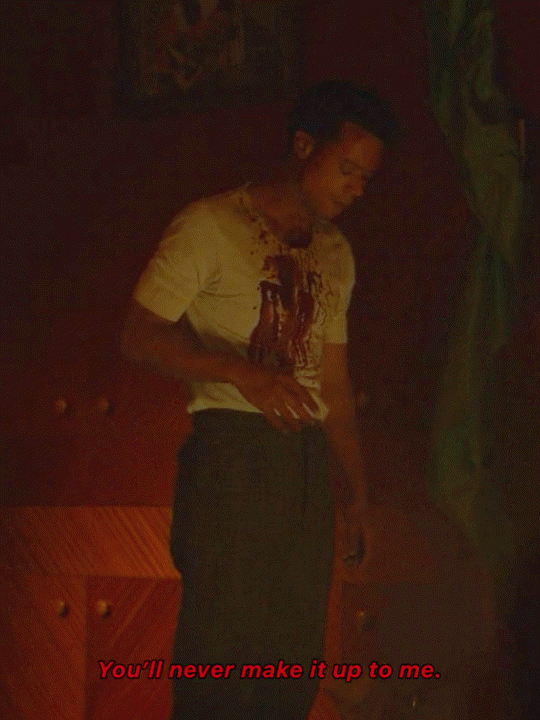
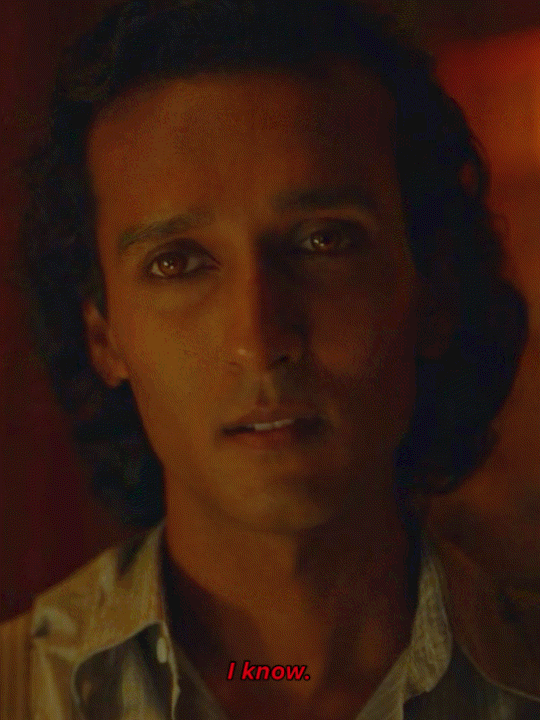
“We go back to something we’ve hit over and over again: is the sum of your character your worst moments? And, yeah, sure, someone could go ahead and say ‘fuck you, Armand, for the rest of your life because of that’…[But] we have seven, eight years hopefully, on this show, if we’re lucky, for contrition and forgiveness everywhere.” - Rolin Jones, The Wrap

#look I'm not implying anything with this gifset of course#just sharing crew analysis!#the one who would survive no matter how the orphan in him wept#iwtv#interview with the vampire#armand#louis de pointe du lac#loumand#assad zaman#rolin jones#no armand enjoyer will ever compete with assad’s analysis i fear
824 notes
·
View notes
Text




2x02/2x07
(inspo)
#interview with the vampire#iwtv#iwtv spoilers#armand#the vampire armand#santiago#santiago iwtv#iwtvedit#tvedit#smallscreensource#i am providing no comentary or analysis i simply gif what i see#beet's gifs#vampireedit
2K notes
·
View notes
Text
the implications of the show possibly making armand muslim are devastating. marius renames arun 'amadeo' meaning 'lover or beloved of god' which was ALREADY gross in the books since it places him as this godlike figure armand had to worship. and then later on, with the cult in rome and santino, he was forced into worshipping satan which caused a whole crisis for him even when book armand was christian. but if show armand is muslim everything gets a whole lot worse. in islam the biggest most unforgivable sin (if you don't repent) is shirk, or idol worship. by fashioning himself as armand's god, marius not only removed armand's cultural identity from him, he has tainted his faith which is arguably one of the only things armand could've held onto. marius essentially damns armand in one of the most irreversible ways possible by grooming him the way he did with religion as a weapon. and it gets even worse with the cult since armand is not only forced to commit shirk but to reject allah, one of the last ties he has to his cultural identity, completely. armand therefore becomes a metaphor and an example of what colonialism inflicts upon the colonised
#im not muslim so im approaching this purely from a post colonial lens and analysis#people who are more knowledgeable than me on islam and this topic as a whole feel free to jump in#inspired by [redacted] telling me about the different sins in islam last year lmao#deeply fascinating conversation and i just remembered it and thinking about it in terms of armand makes my brain go brrr#rambles#interview with the vampire#armand#the vampire armand#the vampire chronicles#personally im a show muslim armand truther until i have evidence otherwise
678 notes
·
View notes
Text
i promise you that Armand was thinking about things besides Daniel during the interview. like i guarantee that some of those lines and microexpressions were about something besides the old man. he has 500 years of interiority and he's selling the art in his house and his marriage is falling apart before his eyes and he's got temple run on that ipad. i promiseeeeeeeee it was not all about Daniel it was like maybe 20% about Daniel.
#lately the only armand analysis i see is like 'wow he was so down bad here'#no he wasn't!!!!! he had one eye on louis and one eye on an ebay bidding war!!!!!!#iwtv#interview with the vampire#armand#daniel molloy#sleepdeprived iwtv
429 notes
·
View notes
Text
I wonder how many of Armand's victims have actively fought back during his "easeful death" speech the way Daniel did.
Daniel's interruptions may be small — not loud or flailing or aggressive — but they're impactful. And while Armand remains composed throughout and continues his practiced monologue without wavering, I'd say for the first three quarters of it he's talking at Daniel. He talks over him, but not really to him. Not until the very end.
Daniel rebuts with:
"I don't want to rest."
"I like my life."
"I have a thing happening in the city."
"I'm a bright young reporter with a point of view."
He's trying so hard to cling onto life. He doesn't want death, even if it is an easeful one. Armand cuts that last interjection off with a "ssh-ssh-ssh," which makes me think this might be a point where Armand's patience is tested. Because things aren't going the way they perhaps normally go when he gives this speech! Daniel isn't begging for death! He's resisting!
And so then, Armand says "rest" a lot near the end of the speech, which we know by this point is an indicator of him controlling bodies. He says, "It's okay, it's okay, it's okay. It'll feel like a bath. Rest. Like honey on your tongue," etc, and maybe this is Armand struggling and fighting harder to get Daniel into the state of obeisance that he wants in his victims. The speech hasn't been working as intended, so he has to rely more on his methods of control and hypnosis.
And finally, after all this, you can see the moment when Daniel finally falls into the trance. It's after a lot of effort on Armand's part, and after he's resorted to his cheaper tricks.
So, if we do get a past Devil's Minion arc, I can see Armand fixating on the fact that Daniel was able to resist the pull and performance of Gentleman Death for an impressive amount of time. That despite all the words Armand said to him, he still longed for life.
Maybe this is what makes him fascinating.
#my ramblings#iwtv s2 e5#amc iwtv#interview with the vampire#daniel molloy#the vampire armand#iwtv#iwtv s2 spoilers#amc iwtv s2 ep 5#iwtv analysis#armand x daniel#devil's minion
906 notes
·
View notes
Text
iwtv + race, briefly dissected by intellectuals



#iwtv#interview with the vampire#iwtv spoilers#sometimes I do enjoy Twitter#iwtv analysis#I plan on keeping these in a safe so I can go back and read them later#fav#iwtv twitter
793 notes
·
View notes
Text
Verlaine. Verlaine. I get it that your husband just died in the 15!manga, beautifully, and that your basement is so comfy but. Verlaine. There's a triple singularity. Verlaine. Verlaine. Fyodor's rocking everybody's shit. Your lil bro's stressed too. VERLAINE SKK IS STUCK IN FRANCE. VERLAINE WHAT MORE OF A STORM DO YOU WANT???
#manifesting verlaine#also worried about adam because while i do want him to be here. if he kills fyodor. won't that affect mary wollstonecraft??#his creator i mean#cause in a way he's like the vampires???#bsd analysis#but not really hahha#bsd shitpost#bungou stray dogs#bsd#bsd manga#bsd chapter 114.5#paul verlaine#bsd verlaine#bsd fyodor#bsd dazai#bsd chuuya#bsd adam
1K notes
·
View notes
Text
Venn diagrams are fun.
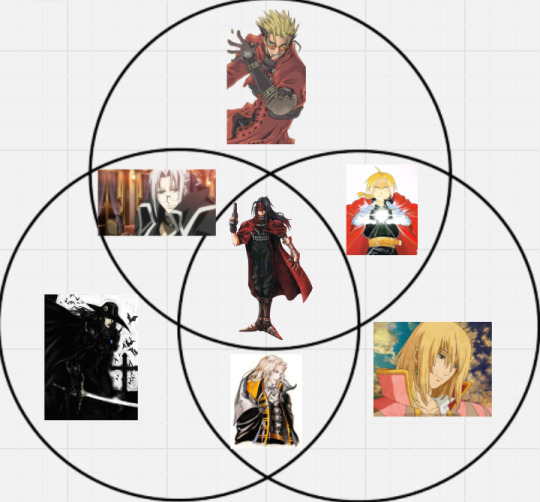
#venn diagrams#trigun#trigun stampede#vash the stampede#vampire hunter d#howls moving castle#howl pendragon#studio ghibli#diana wynne jones#castlevania#alucard#trinity blood#abel nightroad#fullmetal alchemist#edward elric#final fantasy#final fantasy 7#vincent valentine#character analysis#fandom musings
237 notes
·
View notes
Text

“I was being hunted.”
With each rewatch, I’m always struck by the look Lestat gives Louis in 1x01. As Louis tells Daniel, "I was being hunted," the camera pans to Lestat, who is staring at Louis with an expression that can only be described as love and longing.
The first time I watched, I took Louis’ story at face value, believing him as I did with most of his claims. Thus, I perceived this glance far differently than I do now. Now that we know Louis is an unreliable narrator, I see this framing as attempt for Louis way to avoid the guilt and shame he feels over being seduced by Lestat. By casting Lestat as a predator, Louis distances himself from the guilt of choosing him again and again.
While there are countless reasons why Louis might have portrayed Lestat this way, it’s worth revisiting the narrative with the knowledge we have now: that Lestat fell desperately in love with Louis and courted him for months. The look we see here is not that of a manipulator with a grand, conniving plan, but of someone patiently and desperately waiting for Louis to meet him where he is, and to love him deeply as he loves him - a dynamic that will the continue throughout the entire narrative.
#interview with the vampire#iwtv#lestat de lioncourt#louis de pointe du lac#loustat#lestat#iwtv meta#iwtv analysis#iwtv character analysis#lestat x louis#amc interview with the vampire#interview with the vampire amc#iwtv louis#iwtv 1x01
484 notes
·
View notes